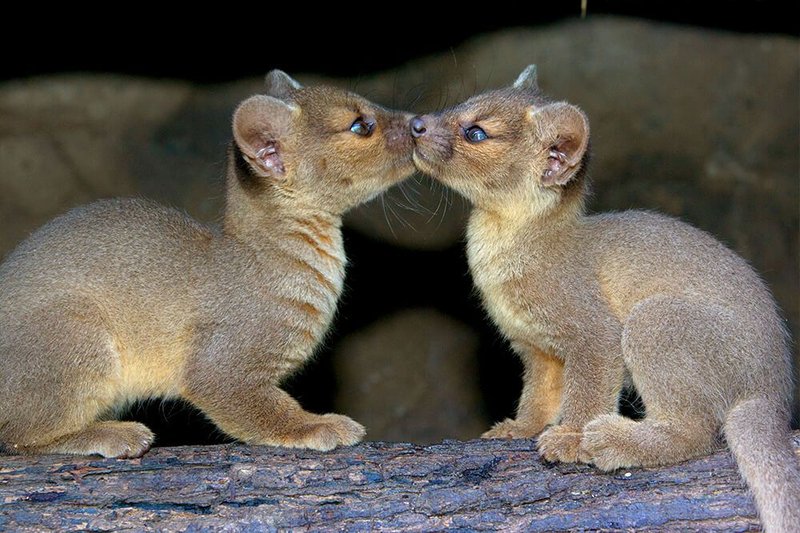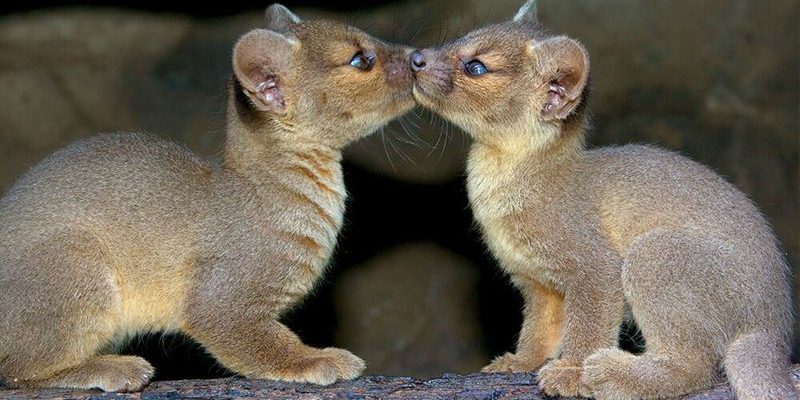
So, how smart is a fossa? Honestly, they exhibit some impressive skills that showcase their adaptability and problem-solving abilities. Let me break it down for you, step by step, so you can appreciate the unique intelligence of this amazing creature.
Fossa Basics: What is a Fossa?
Before diving deeper into their intelligence, it’s essential to understand what a fossa is. The fossa (Cryptoprocta ferox) is the largest carnivore in Madagascar, somewhat resembling a small cougar. These agile animals can weigh between 20 to 25 pounds and have a body length of up to 6 feet, including their long tail, which helps with balance and agility as they navigate trees.
Fossas are fascinating for various reasons, including their unique anatomy and behavior. They have flexible bodies and sharp claws that make them excellent climbers. This ability helps them hunt their primary prey—lemurs—high up in the trees. Imagine if you could climb like a squirrel and sneak up on your lunch! That’s pretty clever in the animal kingdom.
In terms of social structure, fossas are somewhat solitary. They do come together during mating season, but for the most part, they prefer to hunt and live alone. This solitary behavior often leads to unique survival strategies, which we’ll explore in the following sections.
Cognitive Abilities of Fossas
When discussing the intelligence of fossas, we can look at various aspects of their behavior. One compelling point of interest is their problem-solving skills. Research has shown that fossas can adapt their hunting strategies based on their environment. For example, when hunting lemurs, a fossa may change its approach depending on whether the prey is on the ground or in trees.
These adaptive strategies reveal a level of critical thinking. You might be wondering how exactly this works. Fossas tend to observe their prey’s behavior for a while before acting. By doing so, they assess the best way to catch them. This kind of adaptability is a hallmark of intelligent animals, showing their ability to learn and apply that knowledge in real-time.
Additionally, fossas can also remember specific locations where they’ve found food, showcasing their spatial memory. This ability not only allows them to return to good hunting spots but also helps them learn which areas to avoid due to competition or danger.
Social Behavior and Communication
Though fossas are generally solitary creatures, they do communicate with one another, particularly during the mating season. They use a range of vocalizations—like growls, whistles, and hisses—to convey different messages. This intricate communication system highlights an understanding of social dynamics, even if they don’t live in groups.
Their social behavior also reflects their territorial instincts. Fossas will mark their territory with scent markings, which helps them avoid confrontations with other fossas. Understanding this aspect of their behavior gives insight into how intelligence manifests in their day-to-day lives. They know how to communicate their space and maintain social distance, which is quite smart for a predator.
Furthermore, the ability to navigate social interactions and territory is critical for survival. Think about it: if they didn’t understand their social environment, they could easily end up in conflict with other powerful predators.
Hunting Strategies: A Sign of Intelligence
Fossas are remarkable hunters, and their hunting strategies showcase their intelligence. They use a combination of stealth, agility, and keen observational skills to stalk their prey. One fascinating aspect of their hunting is how they can adapt their tactics based on their environment.
For instance, when hunting lemurs, fossas may employ a stealthy approach, staying low to the ground and using cover to get as close as possible. Once they’re in range, they’ll make a quick leap to catch their prey. A clever blend of patience and speed, wouldn’t you agree? This strategic thinking indicates a level of cognitive complexity that goes beyond simple instincts.
In addition to hunting, fossas also exhibit playful behavior, especially when they’re young. Play is crucial for developing skills that they’ll need as adults, like chasing and climbing. Observing young fossas at play is a great reminder that intelligence isn’t just about serious problem-solving; it can also be about learning through fun.
Comparing Fossa Intelligence to Other Animals
You might be wondering how the intelligence of a fossa stacks up against other animals, such as wolves or big cats. While it’s challenging to compare directly, we can look at specific traits. For example, wolves are known for their pack intelligence and cooperative hunting strategies, which are vital for their survival. In contrast, fossas have adapted their intelligence to thrive in a solitary environment.
In terms of climbing and agility, fossas resemble primates more than other carnivores. Their problem-solving skills, especially when it comes to navigating trees to catch lemurs, show similarities to the intelligence found in some monkeys. This comparison sheds light on how different forms of intelligence can evolve based on an animal’s lifestyle and environment.
Ultimately, while fossas may not have the same kind of social intelligence as wolves, their adaptability, problem-solving skills, and communication methods show that they have a unique type of intelligence suited to their life on the island of Madagascar.
Why Understanding Fossa Intelligence Matters
So, why should we care about how smart fossas are? Understanding the intelligence of fossas can deepen our appreciation for biodiversity and the unique adaptations that different species have developed. Each species plays a critical role in its ecosystem, and fossas are no exception. As apex predators in Madagascar, they help maintain the balance of their ecosystems by controlling lemur populations.
Moreover, studying the fossa’s cognitive abilities can provide insights into evolution and animal behavior. By understanding how and why these creatures have developed their intelligence, we can learn more about the broader principles of animal cognition. This knowledge can also help inform conservation efforts, as recognizing the importance of an animal’s intelligence can lead to better protective measures.
Conservation Status and Future of Fossas
Unfortunately, fossas face numerous threats, including habitat loss and hunting. As Madagascar’s forests diminish, the fossa’s population has been declining. Understanding their intelligence and role in the ecosystem can be a crucial factor in conservation strategies.
Efforts to protect their habitat not only help fossas survive but also preserve the rich biodiversity of Madagascar. It’s essential for wildlife enthusiasts and conservationists alike to rally behind these unique animals. After all, the survival of the fossa means the survival of an entire ecosystem that depends on their presence.
In conclusion, the intelligence of the fossa may not be widely recognized, but it deserves attention. From their adaptive hunting strategies to their complex social behaviors and communication skills, these animals are truly remarkable. By appreciating the cognitive abilities of fossas, we can foster greater respect for all living beings and understand our responsibility to protect their habitats.
So next time you think about animal intelligence, don’t forget about the fossa. They may not have the fame of dolphins or elephants, but their cleverness and unique traits make them a worthy addition to the conversation. Embracing the diversity of intelligence in the animal kingdom enriches our understanding of life on our planet. Let’s celebrate the fossa and its remarkable place in the wild!

